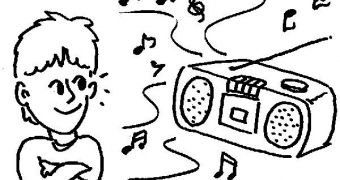According to a new scientific paper, published in the most recent issue of the journal Proceedings of the National Academy of Sciences (PNAS), patients who suffer from reduced vision sensitivity following a stroke seem to be getting better and recover their sight a lot faster if they listen to their favorite tunes. It's still unclear how music acts on the brain, but what's certain is that the latter heals a lot faster when exposed to familiar sounds than by means of standard therapies.
Following strokes, many patients lose a part of their visual acuity, which causes them difficulties when they try to interact with various objects from the outside world. This happens because the attack usually harms portions of the brain that deal with processing visual signals, as well as attention and action cues. Researchers from the Imperial College London and the University of Birmingham, together with colleagues from other institutions, say that their find could potentially be of tremendous help to the over 150,000 people who suffer from strokes in the UK each year.
“Visual neglect can be a very distressing condition for stroke patients. It has a big effect on their day-to-day lives. For example, in extreme cases, patients with visual neglect may eat only the food on the right side of their plate, or shave only half of their face, thus failing to react to certain objects in the environment,” Imperial College London Division of Neurosciences and Mental Health expert Dr. David Soto, who is also the lead author of the PNAS paper, explains.
“We wanted to see if music would improve visual awareness in these patients by influencing the individual's emotional state. Our results are very promising, although we would like to look at a much larger group of patients with visual neglect and with other neuropsychological impairments,” he adds, after studying the effects of music on only three patients who have just suffered strokes.
“Our findings suggest that we should think more carefully about the individual emotional factors in patients with visual neglect and in other neurological patients following a stroke. Music appears to improve awareness because of its positive emotional effect on the patient, so similar beneficial effects may also be gained by making the patient happy in other ways. This is something we are keen to investigate further,” he concludes.

 14 DAY TRIAL //
14 DAY TRIAL //